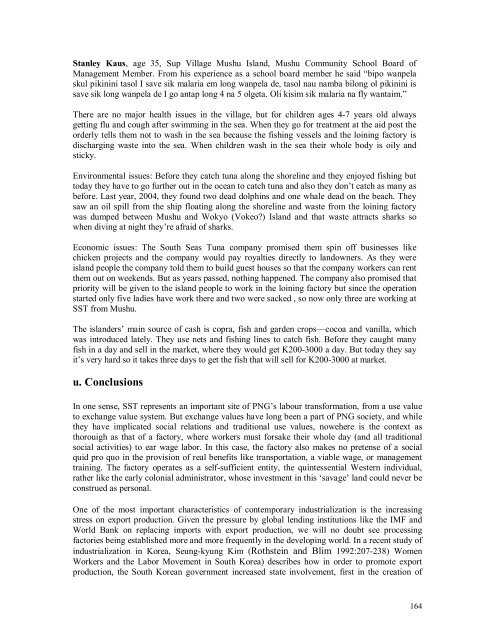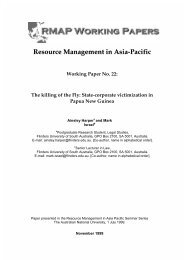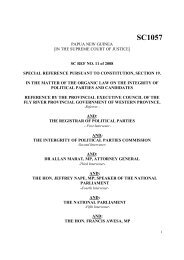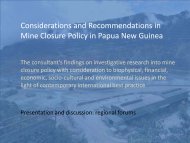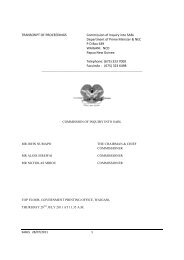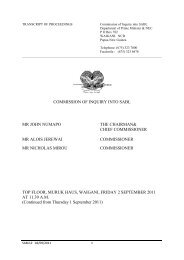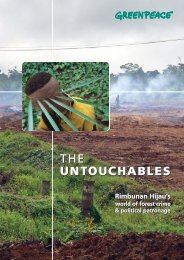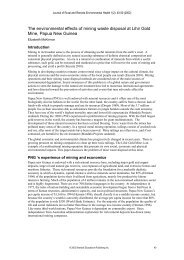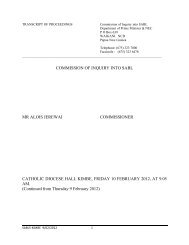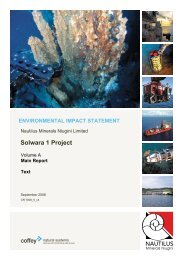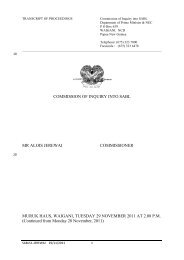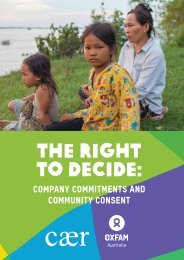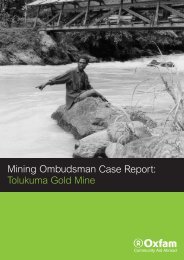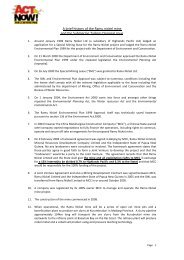Stanley Kaus, age 35, Sup Village Mushu Island, Mushu Community School Board <strong>of</strong>Management Member. From his experience as a school board member he said “bipo wanpelaskul pikinini tasol I save sik malaria em long wanpela de, tasol nau namba bilong ol pikinini issave sik long wanpela de I go antap long 4 na 5 olgeta. Oli kisim sik malaria na fly wantaim.”<strong>The</strong>re are no major health issues in the village, but for children ages 4-7 years old alwaysgetting flu and cough after swimming in the sea. When they go for treatment at the aid post theorderly tells them not to wash in the sea because the fishing vessels and the loining factory isdischarging waste into the sea. When children wash in the sea their whole body is oily andsticky.Environmental issues: Before they catch tuna along the shoreline and they enjoyed fishing buttoday they have to go further out in the ocean to catch tuna and also they don’t catch as many asbefore. Last year, 2004, they found two dead dolphins and one whale dead on the beach. <strong>The</strong>ysaw an oil spill from the ship floating along the shoreline and waste from the loining factorywas dumped between Mushu and Wokyo (Vokeo?) Island and that waste attracts sharks sowhen diving at night they’re afraid <strong>of</strong> sharks.Economic issues: <strong>The</strong> South Seas Tuna company promised them spin <strong>of</strong>f <strong>business</strong>es likechicken projects and the company would pay royalties directly to landowners. As they wereisland people the company told them to build guest houses so that the company workers can rentthem out on weekends. But as years passed, nothing happened. <strong>The</strong> company also promised thatpriority will be given to the island people to work in the loining factory but since the operationstarted only five ladies have work there and two were sacked , so now only three are working at<strong>SST</strong> from Mushu.<strong>The</strong> islanders’ main source <strong>of</strong> cash is copra, fish and garden crops—cocoa and vanilla, whichwas introduced lately. <strong>The</strong>y use nets and fishing lines to catch fish. Before they caught manyfish in a day and sell in the market, where they would get K200-3000 a day. But today they sayit’s very hard so it takes three days to get the fish that will sell for K200-3000 at market.u. ConclusionsIn one sense, <strong>SST</strong> represents an important site <strong>of</strong> PNG’s labour transformation, from a use valueto exchange value system. But exchange values have long been a part <strong>of</strong> PNG society, and whilethey have implicated social relations and traditional use values, nowehere is the context asthorouigh as that <strong>of</strong> a factory, where workers must forsake their whole day (and all traditionalsocial activities) to ear wage labor. In this case, the factory also makes no pretense <strong>of</strong> a socialquid pro quo in the provision <strong>of</strong> real benefits like transportation, a viable wage, or managementtraining. <strong>The</strong> factory operates as a self-sufficient entity, the quintessential Western individual,rather like the early colonial administrator, whose investment in this ‘savage’ land could never beconstrued as personal.One <strong>of</strong> the most important characteristics <strong>of</strong> contemporary industrialization is the increasingstress on export production. Given the pressure by global lending institutions like the IMF andWorld Bank on replacing imports with export production, we will no doubt see processingfactories being established more and more frequently in the developing world. In a recent study <strong>of</strong>industrialization in Korea, Seung-kyung Kim (Rothstein and Blim 1992:207-238) WomenWorkers and the Labor Movement in South Korea) describes how in order to promote exportproduction, the South Korean government increased state involvement, first in the creation <strong>of</strong>164
export processing zones and then in labor control. <strong>The</strong>se are realistic options for PNG. Elsewhere,as for example in India, governments have adopted the strategy <strong>of</strong> encouring non resident citizensto re-invest in their home country (Ibid: 238-246).Contrary to the old modernization thesis, which predicted an erosion <strong>of</strong> kin ties with the spread <strong>of</strong>industrialization, such ties continue to be important in the developing world, and have beenreshaping the nature <strong>of</strong> industrialization, especially in Asia (see Mahbubani 1998).But the picture is complicated by gender. Industrialization almost never favors women, and infact tends to reify patriarchal herarchies that already exist or that arrive, like a Trojan Horse, inthe factory itself. <strong>The</strong>re are no precedents in customary society for the way the women on theloining line at <strong>SST</strong> are treated by supervisors, or treated in general—as a corps <strong>of</strong> assemblyworkers. Whether they are entering the market as wage laborers or as unpaid labor in householdenterprises, women rarely have the options men do, and their access to cash is almost always lessthen men’s. Usually they’re excluded from all but the very lowest-paying jobs, and therefore havelittle choice but to become dependent on husbands or fathers.In Papua New Guinea, however, the proliferation <strong>of</strong> urban and peri-urban markets has been agood thing for women, giving them more control over household production and income. Someargue that this places more stress on traditional relations, but there is more indication that thedepressed combined household income is the greater contributor to domestic violence. It is notthe way women are working in the factory setting that places stress on kinship relations, but theprice <strong>of</strong> working there, in terms <strong>of</strong> household income and time, that threatens to erode the socialfabric. For as long as these young women work at the factory, they remain dependant on familyresources, on their husbands, fathers and brothers. As we’ve seen from some <strong>of</strong> the reports, theymay even turn to selling sex for extra income. But the unmarried women seem to consider theirwage as largely their own spending money, no doubt because it is so negligible. This alienatesthem from the expected role <strong>of</strong> young adults in traditional society, who actively contribute tocustomary and household expenses. Young women workers may be helping their families, to besure, but they’re also buying clothes and sundries that their new roles require. All this enrichesthe novelty and secondhand clothing <strong>business</strong>es, and not the system <strong>of</strong> customary and householdobligations that requires lump sum payments. No doubt it is the women in the marketplace whoare now feeling the greater stress <strong>of</strong> making school, medical and compensation payments forthese households.Contemporary industrialization with its heavy reliance on small-scale production and kinshipdiffers sharply from the original industrial transformation <strong>of</strong> the West. In the Industrial Revlution,factories grew larger and larger and social relations became more impersonal. Some <strong>of</strong> thatimpersonality and factory growth has been exaggerated by social science models which focusedon those aspects <strong>of</strong> industrialization and ignored the persistence <strong>of</strong> kin relations and other"traditional" behaviors. However, although recent historical research has documented thecontinued presence <strong>of</strong> family and ethnic ties, petty commodity production, and homework notunlike that described in the case studies here, there was a clear and significant decline in suchpatterns.It was in the first industrial revolution that "the dispersed organization <strong>of</strong> labor gave way to thedevelopment <strong>of</strong> a new form <strong>of</strong> productive enterprise, the factory" (Wolf 1982:274). Under onero<strong>of</strong> all types and phases <strong>of</strong> work were brought together and concentrated. Contemporaryindustrialization exhibits an opposite pattern, where processes and labour pools are widelydispersed around the globe. It is this new mobility <strong>of</strong> capital that, in some opinions, has led to the165
- Page 1 and 2:
Fishy BusinessThe social impact of
- Page 3 and 4:
4. Townspeople and market women 158
- Page 6 and 7:
More to the point, the contract for
- Page 8 and 9:
‘development’ projects will be
- Page 10 and 11:
whole concept of MSY; the problem o
- Page 12:
noted most reasonably that the skil
- Page 16 and 17:
• That landowners groups be encou
- Page 18 and 19:
This project adopted an open protoc
- Page 20 and 21:
public figures who had seen RD Tuna
- Page 22 and 23:
suddenly costs the government more
- Page 24 and 25:
problems of the poor.’ He pledges
- Page 26 and 27:
scores of landowner groups who regi
- Page 28 and 29:
areas…There were promises of new
- Page 30 and 31:
might say today. This is certainly
- Page 32 and 33:
During the 1950’s over 860,000 co
- Page 34 and 35:
of reorientation of focus and direc
- Page 36 and 37:
But it is the provincial government
- Page 38 and 39:
title, sensu the Windjammer, is ‘
- Page 40 and 41:
Blue Water Tuna is a private PNG co
- Page 42:
9.5.05: The Bismark Fishing Company
- Page 45 and 46:
The two landowning clans of Parom g
- Page 47 and 48:
ilong mi na long tingting bilong ol
- Page 49 and 50:
ol set ups, say olsem 20 or 30 set
- Page 51 and 52:
No contact or awareness with Marien
- Page 53 and 54:
Los Angeles, CA 90021USATel: 1-800-
- Page 55 and 56:
meters out from its original size,
- Page 57 and 58:
The Offshore Masters is going to be
- Page 59 and 60:
I am not aware of any Environmental
- Page 61 and 62:
“Based on the 970 local labour re
- Page 63 and 64:
Water Resources Act (Chapter No. 20
- Page 65 and 66:
The 26 Local Level Governments in t
- Page 67 and 68:
people were made to believe that ne
- Page 69 and 70:
Nianguma, so the leaders of the 8 c
- Page 71 and 72:
3. That there was a totally unbeara
- Page 73 and 74:
p10:p12:73
- Page 75 and 76:
p.14:75
- Page 77 and 78:
. Marine Ripples articleThe followi
- Page 79 and 80:
In general, I feel SSTC has present
- Page 81 and 82:
•how the tuna factory development
- Page 83 and 84:
Responses to Consent Condition Exce
- Page 85 and 86:
“Sometimes while working we are t
- Page 87 and 88:
fisheries myself at one stage and f
- Page 89 and 90:
N: “Have you sponsored sporting g
- Page 91 and 92:
never cleaned fish before, that was
- Page 93 and 94:
IB: “Oh sure, but somebody’s go
- Page 95 and 96:
Philomena Naura: “The smell aroun
- Page 97 and 98:
There is no covering to the oxidizi
- Page 99 and 100:
Above: four consecutive pay slips f
- Page 101 and 102:
Above is a list of curses said to b
- Page 103 and 104:
duties on one of the ships offloadi
- Page 105 and 106:
on the side of the fishing vessel.
- Page 107 and 108:
The fishery observer told us that i
- Page 109 and 110:
Speaking of prostitution on fishing
- Page 111 and 112:
and if any major disruptions occur
- Page 113 and 114: Most of us here are very unfortunat
- Page 115 and 116: The husband of the woman employed a
- Page 117 and 118: Thomas Nigints was one of the few p
- Page 119 and 120: Did SST place FADs in the sea?The c
- Page 121 and 122: doing it, it’s going to be over o
- Page 123 and 124: Landowners are also deeply disturbe
- Page 125 and 126: places or settlement where they are
- Page 127 and 128: in the revenue, so when the opportu
- Page 129 and 130: And as soon as they’d finished th
- Page 131 and 132: There is no legal case as yet with
- Page 133 and 134: owns the land legally and therefore
- Page 135 and 136: There is still need to recruit more
- Page 137 and 138: In regard to the production, by the
- Page 139 and 140: The company invited interested peop
- Page 141 and 142: strategy is very well used by forei
- Page 143 and 144: employees and those whose work requ
- Page 145 and 146: The present Human Resource Manager
- Page 147 and 148: working gear? In my section I wear
- Page 149 and 150: working for a whole first week with
- Page 151 and 152: Serah from Manam island, married wi
- Page 153 and 154: stret long mipela ol mama husait I
- Page 155 and 156: The supervisors in the plant/engine
- Page 157 and 158: The color of the sea has changed. F
- Page 159 and 160: Donald Jacob, Catrans fuel distribu
- Page 161 and 162: Kapmandu Service station. Did South
- Page 163: Three women involved with roadside
- Page 167 and 168: When we asked if this meant sportin
- Page 169 and 170: then men’s. Usually they’re exc
- Page 171 and 172: The WWF consultant also notes that
- Page 173 and 174: of a company like SST cannot be pla
- Page 175 and 176: East Sepik Governor Arthur Somare s
- Page 177 and 178: The cost of the project is between
- Page 179 and 180: The National Shipping Page, 1.6.04W
- Page 181 and 182: that have similar fish factory set-
- Page 183 and 184: Infofish website : PNG: Tuna export
- Page 185 and 186: Post-Courier 20.6.05185
- Page 187 and 188: Did your application form ask you a
- Page 189 and 190: Do you know whether the Provincial
- Page 191 and 192: The Provincial AdministratorDept. o
- Page 193 and 194: 4. Human Resources registerees, Kew
- Page 195 and 196: 195
- Page 197 and 198: Under Spin-Off Business Activities
- Page 199 and 200: Finally, Honourable Ministers, Memb
- Page 201 and 202: The adverse non-immune (toxic) and
- Page 203 and 204: low income) will have an impact in
- Page 205 and 206: ed and pink plastic roses are every
- Page 207 and 208: 207
- Page 209 and 210: Tuna fisheriesThe management system
- Page 211 and 212: • Monitor interactions between th
- Page 213 and 214: Programme is expanding this program
- Page 215 and 216:
This office recommends that, since
- Page 217 and 218:
commercial industry still deny any
- Page 219 and 220:
219
- Page 221 and 222:
221
- Page 223 and 224:
REPORTER: If you come and you put t
- Page 225 and 226:
Berman, M. 1997. Faust, the First D
- Page 227 and 228:
Lutkehaus, N., C. Kaufman, W.E. Mit


